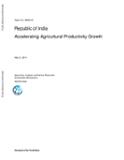The World Bank is a vital source of financial and technical assistance to developing countries around the world. We are not a bank in the ordinary sense but a unique partnership to reduce poverty and support development. The World Bank Group has two ambitious goals: End extreme poverty within a generation and boost shared prosperity.
- To end extreme poverty, the Bank's goal is to decrease the percentage of people living on less than $1.25 a day to no more than 3% by 2030.
- To promote shared prosperity, the goal is to promote income growth of the bottom 40% of the population in each country.
The World Bank Group comprises five institutions managed by their member countries.
The World Bank Group and Land: Working to protect the rights of existing land users and to help secure benefits for smallholder farmers
The World Bank (IBRD and IDA) interacts primarily with governments to increase agricultural productivity, strengthen land tenure policies and improve land governance. More than 90% of the World Bank’s agriculture portfolio focuses on the productivity and access to markets by small holder farmers. Ten percent of our projects focus on the governance of land tenure.
Similarly, investments by the International Finance Corporation (IFC), the World Bank Group’s private sector arm, including those in larger scale enterprises, overwhelmingly support smallholder farmers through improved access to finance, inputs and markets, and as direct suppliers. IFC invests in environmentally and socially sustainable private enterprises in all parts of the value chain (inputs such as irrigation and fertilizers, primary production, processing, transport and storage, traders, and risk management facilities including weather/crop insurance, warehouse financing, etc
For more information, visit the World Bank Group and land and food security (https://www.worldbank.org/en/topic/agriculture/brief/land-and-food-security1
Resources
Displaying 1651 - 1655 of 4907Models for Recognizing Indigenous Land Rights in Latin America
This paper represents an important
dimension in filling Latin America history's gaps
through the lens of land rights. The continent was populated
by many nations, functioned in harmony with nature, had a
variety of cultures and languages, and, developed many
different socio-economic systems (nationally and locally).
These nations were sovereign and recognized from Alaska to
Patagonia. Indeed, among all of them, we know they had very
Republic of India : Accelerating Agricultural Productivity Growth
In the past 50 years, Indian agriculture has undergone a major transformation, from dependence on food aid to becoming a consistent net food exporter. The gradual reforms in the agricultural sector (following the broader macro-reforms of the early 1990s) spurred some unprecedented innovations and changes in the food sector driven by private investment. These impressive achievements must now be viewed in light of the policy and investment imperatives that lie ahead.
A Guide for Local Benefit Sharing in Hydropower Projects
Local benefit sharing in hydropower
projects can be defined as the systematic efforts by project
proponents to sustainably benefit local communities affected
by hydropower investments. Benefit sharing is a promising
approach for implementing hydropower projects sustainably,
and is emerging as a supplement to the requirements of
compensation and mitigation. Benefit sharing can provide
equitable development, sustainability, and smooth project
Women's Empowerment and Socio-Economic Outcomes : Impacts of the Andhra Pradesh Rural Poverty Reduction Program
The paper explores whether one of the
largest programs in the world for women's empowerment
and rural livelihoods, the Indira Kranti Patham in Andhra
Pradesh, India, has had an impact on the economic and social
wellbeing of households that participate in the program. The
analysis usespanel data for 4,250 households from two rounds
of a survey conducted in 2004 and 2008 in five districts.
Propensity score matching was used to construct control
Market and Nonmarket Transfers of Land in Ethiopia : Implications for Efficiency, Equity, and Nonfarm Development
The authors use data from Ethiopia to
empirically assess determinants of participation in land
rental markets, compare these to those of administrative
land reallocation, and make inferences on the likely impact
of households' expectations regarding future
redistribution. Results indicate that rental markets
outperform administrative reallocation in terms of
efficiency and poverty. Households who have part-time jobs







